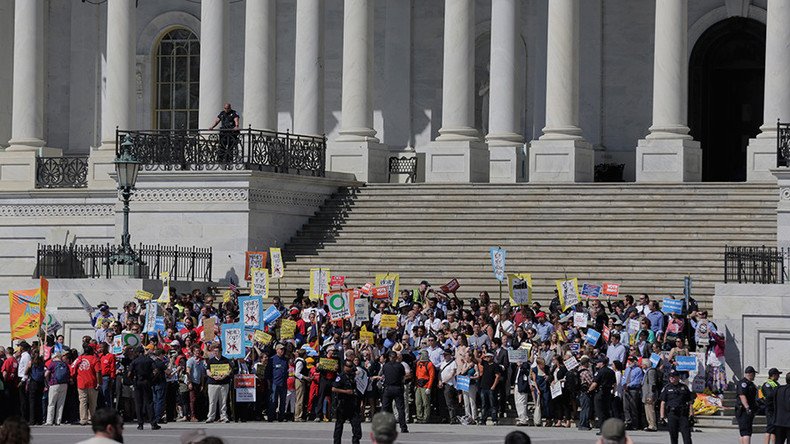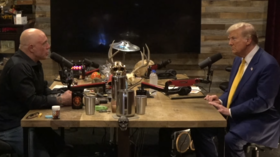Locked doors, unhooked phones & cold shoulders: Congress-voter disconnects persist

What we’ve got here is failure to communicate, as the classic movie line goes. Some in Congress just can’t be reached, three recent examples show. But constituents aren’t the only ones frustrated, as Senate Democrats meet to discuss outreach to Trump voters.
Dissatisfaction with Congress has long been a bipartisan reality for Americans, and elections every two years don’t seem to be bridging the divide. A Real Clear Politics average of eight polls conducted between January 4 and 25 shows Congress' approval rating at just 18.5 percent.
The anger only grows when the people and their elected representatives can’t talk to one another, which three recent scenarios illuminate.
On Wednesday, phones for Senate Whip Dick Durbin’s (D-Illinois) offices in Washington, DC and Chicago were temporarily taken off the hook, leaving callers redirected to an automated answering service, according to the Washington Free Beacon. The Republican Jewish Coalition had urged its email list members to call Durbin, who’s believed to be holding up legislation condemning the United Nations resolution against Israeli settlements in the occupied West Bank.
Three weeks ago, Planned Parenthood activists attempting to deliver a petition to House Speaker Paul Ryan (R-Wisconsin) were met by only locked doors and six Capitol police officers. Their appeal to stop defunding efforts against the nonprofit organization garnered 87,000 signatures, but the group apparently failed to schedule an appointment with Ryan. US News & World Report reported that the House of Representatives had been in recess at the time and that immediately following the recess, the House certified the Electoral College results, making Donald Trump the next president. Still, the visuals on social media shared thousands of times furthered the widely held feeling that Congress isn’t listening.
.@SpeakerRyan's office sent 6 security guards to block delivery of 87K #IStandWithPP petitions telling Ryan not to defund Planned Parenthood pic.twitter.com/56QHwhjR2q
— Planned Parenthood (@PPact) January 6, 2017
A more egregious example of disconnect came on Saturday, January 14, when Rep. Mike Coffman (R-Minnesota) ducked out six minutes early from a regular townhall with constituents. Hundreds of people were left waiting to meet Coffman, but he snuck out a back door.
While more than 100 people were waiting to meet with him, Mike Coffman sneaks out early from his own community event. #9Newspic.twitter.com/NAZlXTKgQm
— Nelson Garcia (@9NewsEducation) January 14, 2017
Instead of meeting voters individually, Coffman opted to see four people at a time, bringing his grand total to over 70 in just a little less time than the hour-and-a-half promised.
100 wait get into @RepMikeCoffman "town hall. Only 4 citizens allowed at a time. #cd6resistpic.twitter.com/8c7Q3OQXby
— Steve Krizman (@SteveKrizman) January 14, 2017
Division was an unfortunate hallmark of the 2016 election, with the outcome shaking some Senate Democrats’ understanding of how to best represent voters in their states. According to Politico, they have gathered at a private retreat in Shepherdstown, West Virginia, to hear strategies on how best to communicate with Trump voters.
Senator Joe Manchin (D-West Virginia), one of 10 Democratic senators facing reelection in 2018 in states won by Trump, moderated a “discussion with Trump voters” on Thursday, according to a draft schedule, Politico reported.
READ MORE: 'We have to deliver': Trump calls congressional Republicans to action
Other sessions covered “speaking to those who feel invisible in rural America," and “Listening to those who feel unheard,” while one was titled “Rising America — They feel unheard too.”













